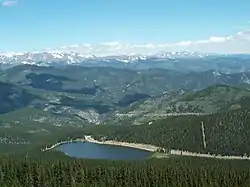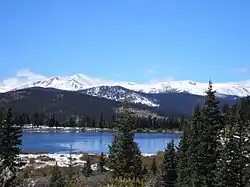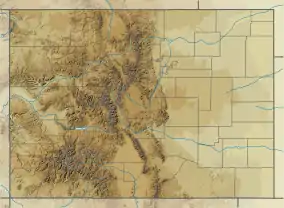Echo Lake Park
Echo Lake Park is a park located along the Mount Evans Scenic Byway about 33.5 mi (54 km) west of Denver, Colorado. The park provides a stone shelter with picnic tables and barbecue grills on one end of the lake, and the 1926 Echo Lake Lodge (gift shop and restaurant service only) and an Arapaho National Forest campground are found at the other. Access to backpacking trails, including the Chicago Lakes trail and Lincoln Lakes trail, can be found adjacent to the lake. The park is part of the Denver Mountain Parks system.
Echo Lake Park | |
 Echo Lake from above | |
| Nearest city | Idaho Springs, Colorado |
|---|---|
| Area | 600 acres (2.4 km2) |
| Built | 1921, 1926 |
| Architect | Jules Jacques Benoit Benedict |
| Architectural style | Rustic |
| MPS | Denver Mountain Parks MPS |
| NRHP reference No. | 95000109[1] |
| CSRHP No. | 5CC.646 |
| Added to NRHP | February 24, 1995 |
Echo Lake Park was listed on the National Register of Historic Places in 1995. The listing included two contributing buildings, two contributing structures, and a contributing sites on 600 acres (2.4 km2). It included the Echo Lake Lodge, built in 1926, which was designed by Denver architect Jules Jacques Benoit Benedict, a two-story octagonal log building on a base of local granite that resembles a Native American earth lodge.[1][2]
Echo Lake, along with Mount Evans, was designated as a historic site by the American Physical Society in 2017, in honor of many cosmic-ray physics experiments conducted at the lake and on the mountain between 1935 and 1960. The historic plaque is outside the Echo Lake Lodge.[3]
Echo Lake
| Echo Lake | |
|---|---|
 After Year's First Snowfall | |
 Echo Lake  Echo Lake | |
| Location | Clear Creek County, Colorado, United States |
| Coordinates | 39°39′30″N 105°36′12″W |
| Type | oligotrophic |
| Basin countries | United States |
| Surface elevation | 10,600 ft (3,230 m) |
Echo Lake is a shallow, oligotrophic lake situated at 10,600 ft (3,230 m) above sea level near Mount Evans in the Colorado Rocky Mountains. It formed during the latest period of glaciation roughly 10,000 years ago. As glaciers retreated in the Chicago Creek valley, lateral moraines formed a natural dam to drainage, forming the lake. The ecosystem around the lake is dominated by Engelmann Spruce (Picea engelmannii) and Subalpine Fir (Abies lasiocarpa), with some Limber Pine (Pinus flexilis) on exposed sites.
See also
- National Register of Historic Places listings in Clear Creek County, Colorado
- Summit Lake Park
- List of lakes in Colorado
References
- "National Register Information System". National Register of Historic Places. National Park Service. November 2, 2013.
- Maureen Van Norden (February 25, 1994). "National Register of Historic Places Registration: Echo Lake Park / 5CC 646". National Park Service. Retrieved June 15, 2018. With accompanying 10 photos
- Mount Evans and Echo Lake, Colorado, part of the APS Historic Sites Initiative; accessed Oct, 2019.
External links
| Wikimedia Commons has media related to Echo Lake Park (Clear Creek County, Colorado). |
- Denver Mountain Parks - Echo Lake
- U.S. Geological Survey Geographic Names Information System: Echo Lake Park
- U.S. Geological Survey Geographic Names Information System: Echo Lake
